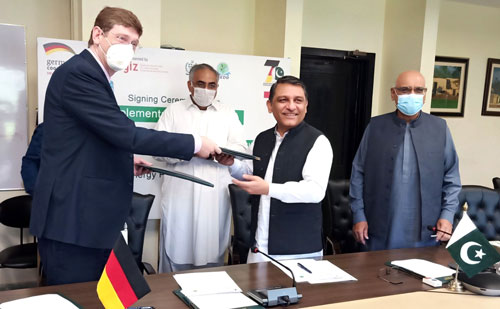Staff Reporter Islamabad
A new implementation agreement (IA) between GIZ Pakistan and the Ministry of Energy (Power Division) signed here Friday to unveil the Pakistani Renewable Energy and Energy Efficiency II (REEE II) 8.1 million Euros project.
Under the agreement, GIZ Pakistan will conduct the so-called Renewable Energy and Energy Efficiency (REEE II) project that will provide technical support to the Ministry of Energy –(Power Division) and its associated Alternative Energy Development Board (AEDB), said a press release.
The project aimed at contributing effectively to the energy transition in Pakistan.
The 8.1 million Euro project is commissioned by the German Federal Ministry for Economic Cooperation and Development (BMZ).
During the ceremony, Secretary Power Division, Ali Raza Bhutta, and Tobias Becker, Country Director GIZ Pakistan, reiterated the commitment to strengthen their cooperation.
CEO AEDB, Shah Jahan Mirza, and other notables from both sides were present on the occasion.
Speaking on the occasion, Ali Raza Bhutta said, “A major milestone in the energy transition in Pakistan is the new Renewable Energy Policy approved by Council of Common Interest in August 2020 the Alternative and Renewable Energy (ARE) Policy.
The policy aims for a substantial shift in the power generation capacity to RE sources, moving from a current 6% to 20% by 2025 and 30% by 2030”.










